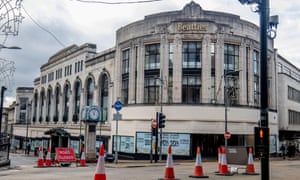Crazy golf on the first floor? UK’s department stores face radical remake
Gyms, crazy golf, student flats, hotels or even a whisky-based tourist attraction: the future of many department store sites is unlikely to involve shopping. More than 200 of them are now empty or closing next year, and property experts say the shift will prompt a reinvention of malls and town centres on a scale not seen since the postwar years.
Last week’s decision to wind down Debenhams is likely to see the closure of 124 stores – or just over a million square metres of retail floor space – in England and Wales. That’s the equivalent of 148 Premier League football pitches seeking a new purpose, according to property advisory firm Altus Group.
Before the latest closures, Debenhams had already shut more than 40 stores in the past two years. Meanwhile, at least 11 House of Fraser sites have closed since August 2018, and more are expected to bring down the shutters next year.
John Lewis has also recently closed eight outlets: half of these were full-scale department stores and are now standing empty. That, in turn, followed the collapse of the Beales chain, which left its 22 stores vacant. Only one has since reopened.
“This is apocalyptic. We are going to see the biggest change in urban grain [the pattern of streets] since the second world war,” said Mark Robinson, chair of the government-backed High Streets Task Force.
“Department stores have supported the footfall that drives people through the doors. We are going to have to evolve a whole new way of looking at the purpose of towns and centres,” said Robinson.
There will be no single solution. What works in Hull will not suit High Wycombe. “Putting a chi-chi food market like Altrincham’s in every department store is not the answer,” said Robinson. “Public consultation is key. You have to look for the answer within places and take local communities with you.”
A look at what happened to BHS’s 164-strong chain, which collapsed in 2016, highlights the scale of the challenge. Four years after its demise, just over a quarter of former BHS stores remain empty, according to analysis by the Local Data Company.
Less than half continue to trade as large stores and the remaining 30% have been redeveloped – either by demolishing or completely rebuilding the interior, splitting them into smaller stores or merging them into neighbouring buildings.
Primark took on about five stores, B&M and Sports Direct took on three each, while others now house TK Maxx, Metro Bank or H&M.
In 2020, there are likely to be few retail takers for large stores. Chains such as Marks & Spencer and Next are also closing outlets, while Primark has largely completed its UK estate.
Some department stores will switch to leisure use, such as cinemas. The former BHS on Oxford Street, for example, has been split into a Swingers golf centre, a food hall and the UK’s first outlet for Reserved, a Polish fashion brand.
In Reading, Hammerson has won planning permission to turn a House of Fraser outlet into a food hall, bowling alley and crazy golf course. Edinburgh’s House of Fraser on Princes Street is being developed by drinks firm Diageo into a tourist attraction promoting Johnnie Walker whisky.

Several other House of Fraser outlets, including those in Birmingham, Lincoln and Exeter, are set to become hotels alongside shops and offices, as is Debenhams in Manchester.
West London’s Westfield shopping centre has permission to turn two-thirds of a House of Fraser into a co-working space, while at least one department store in Bristol may become student accommodation.
Elsewhere, local authorities may play a more central role in reinventing the space for civic amenities such as health centres, nursery schools or libraries, if the cash can be found.
In Folkestone, one option for the former Debenhams site, which has been bought by the local authority, is a mix of retirement homes and a healthcare centre alongside leisure facilities such as a cinema.
Another part of the jigsaw will be homes. Where once they were citadels of shopping, out-of-town malls are now looking to reinvent themselves as new towns, with homes alongside retail and other services.
At Lakeside in Thurrock, Essex, there is a plan to create more than 1,000 homes. Some authorities see an opportunity to use similar ideas to bring people back into city centres hit hard by the pandemic.
David Fox, co-head of retail at property advisory firm Colliers, thinks that the landlords of three-quarters of Debenhams’ current sites will already have a plan for the future that may involve a mix of smaller stores and other uses. But some older stores may be harder to reinvent. The cost of stripping out asbestos is prohibitively expensive, and holds up refits or even demolition.
For some, the answer could even be goingback to nature. In Stockton-on-Tees, the local authority is set to turn a moribund 1970s local shopping centre into a park, and a similar plan is now being floated in Nottingham.
Source: Read Full Article

